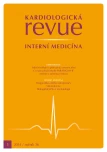Adverse effects of biological therapy in rheumatology
Authors:
M. Olejárová
Authors‘ workplace:
Revmatologický ústav a Revmatologická klinika 1. LF UK, Praha
Published in:
Kardiol Rev Int Med 2014, 16(5): 426-430
Category:
Internal Medicine
Overview
Biological therapy represents the most efficient approach in the management of inflammatory rheumatic diseases. It has significantly improved the prognosis of rheumatic patients as welland their quality of their life. TNFα inhibitors (infliximab, adalimumab, golimumab, certolizumab, etanercept), abatacept, rituximab and tocilizumab are currently registered for the treatment of rheumatoid arthritis in the Czech Republic. Most of the TNFα inhibitors are also registered also for spondyloarthritides (ankylosing spondylitis, psoriatic arthritis, non-radiographic spondyloarthritis). The Ssignificant anti-inflammatory effect on the immune system reactions network may also induce various undesirable effects, including serious adverse events. The benefit of biological treatment is significantly higher than the risk of potential adverse events,; nevertheless, it is very important to know their spectrum (infections; pulmonary, cardiovascular, neurological, haematological diseases etc.), diagnose them actively, and treat or prevent them. Safety monitoring of biological treatment follows the guidelines of professional societies.
Key words:
biological treatment – adverse effects – infliximab – adalimumab – golimumab – certolizumab – etanercept – abatacept – rituximab – tocilizumab – inflammatory rheumatic diseases
Sources
1. Olejárová M. Biologická léčba v revmatologii. Praha: Mladá Fronta 2010.
2. Askling J, Fored CM, Brandt L et al. Time ‑ dependent increase in risk of hospitalisation with infection among Swedish RA patients treated with TNF antagonists. Ann Rheum Dis 2007; 66 : 1339 – 1344.
3. Listing J, Strangfeld A, Kary S et al. Infections in patients with rheumatoid arthritis treated with biologic agents. Arthritis Rheum 2005; 52 : 3403 – 3412.
4. Curtis JR, Patkar N, Xie A et al. Risk of serious bacterial infections among rheumatoid arthritis patients exposed to tumor necrosis factor alfa antagonists. Arthritis Rheum 2007; 56 : 1125 – 1133.
5. Dixon WG, Hyrich KL, Watson KD et al. Drug‑specific risk of tuberculosis in patients with rheumatoid arthritis treated with anti‑TNF therapy: results from the British Society for Rheumatology Biologics Register (BSRBR). Ann Rheum Dis 2010; 69 : 522 – 528. doi: 10.1136/ ard.2009.118935.
6. Askling J, Fored CM, Brandt L et al. Risk and case characteristics of tuberculosis in rheumatoid arthritis associated with tumor necrosis factor antagonists in Sweden. Arthritis Rheum 2005; 52 : 1986 – 1992.
7. Ramiro S, Gaujoux ‑ Viala C, Nam JL et al. Safety of synthetic and biological DMARDs: a systematic literature review informing the 2013 update of the EULAR recommendations for management of rheumatoid arthritis. Ann Rheum Dis 2014; 73 : 529 – 535. doi: 10.1136/ annrheumdis ‑ 2013 ‑ 204575.
8. Gómez ‑ Reino JJ, Carmona L, Angel Descalzo M. Risk of tuberculosis in patients treated with tumor necrosis factor antagonists due to incomplete prevention of reactivation of latent infection. Arthritis Rheum 2007; 57 : 756 – 761.
9. Tubach F, Salmon D, Ravaud P et al. Biobadaser Group. Risk of tuberculosis is higher with anti‑tumor necrosis factor monoclonal antibody therapy than with soluble tumor necrosis factor receptor therapy: The three‑year prospective French research axed on tolerance of biotherapies registry. Arthritis Rheum 2009; 60 : 1884 – 1894. doi: 10.1002/ art.24632.
10. Bongartz T, Sutton AJ, Sweeting MJ et al. Anti‑TNF antibody therapy in rheumatoid arthritis and the risk of serious infections and malignancies: systematic review and meta‑analysis of rare harmful effects in randomized controlled trials. JAMA 2006; 295 : 2275 – 2285.
11. Vencovský J et al. Bezpečnost biologické léčby – doporučení České revmatologické společnosti. Čes Revmatol 2009; 3 : 146 – 160.
12. Atzeni F, Sarzi ‑ Puttini P, Mutti A et al. Long‑term safety of abatacept in patients with rheumatoid arthritis. Autoimmun Rev 2013; 12 : 1115 – 1117. doi: 10.1016/ j.autrev.2013.06.011.
13. Faurschou M, Jayne DR. Anti‑B cell antibody therapies for inflammatory rheumatic diseases. Annu Rev Med 2014; 65 : 263 – 278. doi: 10.1146/ annurev ‑ med ‑ 070912 ‑ 133235.
14. Keene DL, Legare C, Taylor E et al. Monoclonal antibodies and progressive multifocal leukoencephalopathy. Can J Neurol Sci 2011; 38 : 565 – 571.
15. Tanaka T, Hishitani Y, Ogata A. Monoclonal antibodies in rheumatoid arthritis: comparative effectiveness of tocilizumab with tumor necrosis factor inhibitors. Biologics 2014; 8 : 141 – 153. doi: 10.2147/ BTT.S37509.
Labels
Paediatric cardiology Internal medicine Cardiac surgery CardiologyArticle was published in
Cardiology Review

2014 Issue 5
-
All articles in this issue
- Kidneys and heart failure
- Treatment of anemia and iron deficiency from the hematologist’s perspective
- Treatment of anaemia and iron deficiency in chronic heart failure
- Treatment of sideropenic anemia in gastroenterology
- Treatment of iron deficiency anaemia from the nephrologist’s point of view
- Aerobic and specific inspiratory muscle training in patients with chronic heart failure
- The profile of patients with acute heart failure managed in pre‑hospital setting
- Rupture of a sinus of Valsalva aneurysm as an unusual cause of chest pain – case report
- Conclusions of the PARADIGM‑ HF study
- Osteoporosis diagnosis and treatment
- Antiphospholipid syndrome – diagnostics, manifestation and treatment
- Systemic sclerosis
- Biologics in the treatment of rheumatoid arthritis
- Adverse effects of biological therapy in rheumatology
- Heart failure and COPD – Review Article
- Heart failure and diabetes mellitus
- Cardiology Review
- Journal archive
- Current issue
- About the journal
Most read in this issue
- Treatment of anemia and iron deficiency from the hematologist’s perspective
- Antiphospholipid syndrome – diagnostics, manifestation and treatment
- Adverse effects of biological therapy in rheumatology
- Systemic sclerosis
